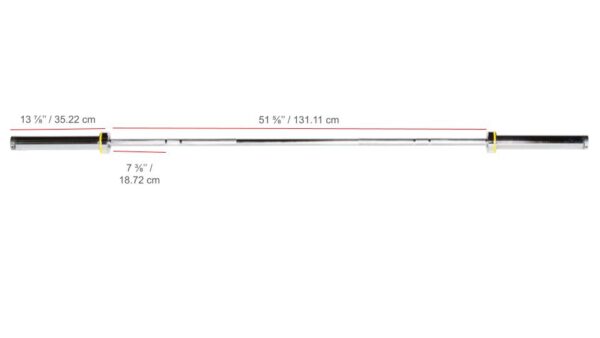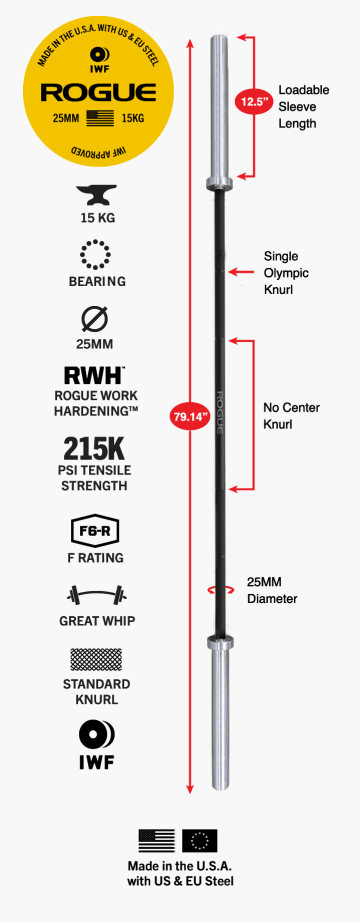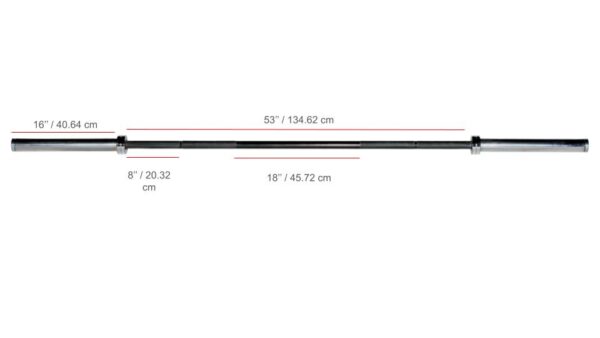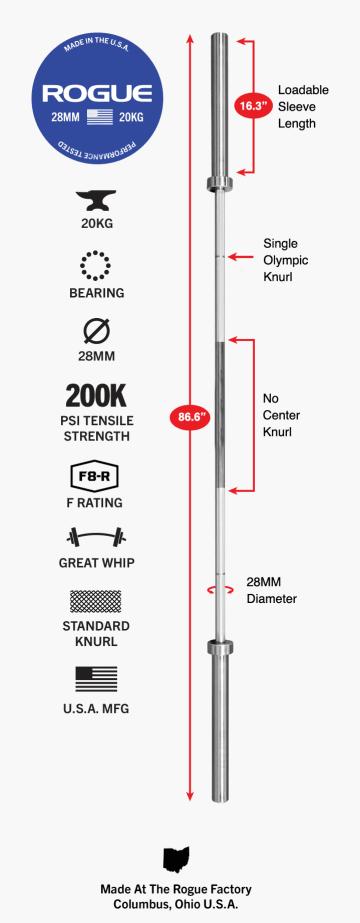Have you ever wondered how long an Olympic barbell really is? Whether you’re setting up your home gym or just curious about the equipment pros use, knowing the exact length can make a big difference.
The size affects how you grip the bar, your workout space, and even your lifting performance. Stick with me, and you’ll discover everything you need to know about Olympic barbells—so you can lift smarter and train better. Ready to find out the perfect length for your next workout?
Let’s dive in!

Standard Olympic Barbell Length
The Olympic barbell is a key piece of equipment in weightlifting. It comes in standard sizes for men and women. Knowing the length helps athletes choose the right bar for their training.
This article explains the standard lengths and dimensions of men’s and women’s Olympic barbells. You will learn the differences and what to expect.
Men’s Olympic Bar Dimensions
The men’s Olympic barbell has specific dimensions set by international standards. These dimensions affect how the bar handles during lifts.
| Dimension | Measurement |
| Length | 2.2 meters (7.2 feet) |
| Weight | 20 kilograms (44 pounds) |
| Sleeve Diameter | 50 millimeters |
| Knurling | Yes, with center knurl |
Women’s Olympic Bar Dimensions
The women’s Olympic barbell is slightly smaller and lighter than the men’s version. It is designed for female athletes and beginners.
- Length: 2.01 meters (6.6 feet)
- Weight: 15 kilograms (33 pounds)
- Sleeve Diameter: 50 millimeters
- Knurling: Yes, without center knurl
Variations In Barbell Length
Olympic barbells come in different lengths depending on their use. The length affects how you lift and the types of exercises you can do.
Not all barbells are the same size. There are training barbells and specialty bars, each with unique lengths.
Training Barbells
Training barbells are made for general strength workouts. They often have a standard length but can vary slightly.
Most training barbells are about 7 feet (2.2 meters) long. This length suits many exercises like squats and bench presses.
- Standard training barbell length: 7 feet (2.2 meters)
- Weight: Usually around 20 kilograms (44 pounds)
- Used for powerlifting and general gym workouts
Specialty Bars
Specialty bars have different lengths to help with specific lifts. Their size and shape change based on their purpose.
Examples include shorter bars for women or longer bars for certain Olympic lifts. Some specialty bars are shorter than 7 feet.
- Women’s Olympic barbell: About 6.5 feet (2 meters) long
- Deadlift bars: Can be longer than 7 feet for better flex
- Trap bars: Usually shorter and shaped differently for safety
Materials And Construction
Olympic barbells are designed to be strong and durable. Their materials and build affect how they perform during lifts.
This section looks at the steel types and knurling patterns used in Olympic barbells.
Steel Types
The steel used in Olympic barbells must handle heavy weights and resist bending. Different types of steel offer various strengths and flexibilities.
| Steel Type | Yield Strength (PSI) | Common Use |
|---|---|---|
| High-Tensile Steel | 150,000 – 180,000 | Standard barbells for general lifting |
| Chromium Steel | 180,000 – 215,000 | Higher-end barbells, rust resistant |
| Stainless Steel | 190,000 – 220,000 | Premium barbells with corrosion resistance |
Knurling Patterns
Knurling is the textured pattern on the barbell’s grip area. It helps lifters hold the bar securely without slipping.
- Standard Knurl: Light texture, good for beginners and general use
- Aggressive Knurl: Deep texture, preferred for heavy lifting and competitions
- No Center Knurl: Grip without knurling in the middle, common in powerlifting bars
- Center Knurl: Knurling in the middle to help with grip placement

Impact Of Length On Performance
The length of an Olympic barbell affects how you lift weights. It changes balance and control during exercises.
Understanding barbell length helps improve your workout and avoid injuries.
Lift Technique
Longer barbells allow for a wider grip, which can change how you perform lifts. This affects muscle use and form.
A standard Olympic bar is about 7 feet long. This length helps lifters keep proper technique in squats, deadlifts, and presses.
Barbell Stability
Barbell length impacts stability during lifts. A longer bar spreads the weight more evenly across the plates.
This makes the bar less likely to wobble, helping lifters keep control and balance under heavy loads.
Choosing The Right Barbell
Choosing the right Olympic barbell depends on your workout needs. The barbell length and type affect your exercise experience.
This guide helps you understand important factors when selecting a barbell. Focus on purpose and budget to find the best fit.
Purpose And Use
Olympic barbells usually measure 7 feet long. This size fits most exercises like squats, deadlifts, and bench presses.
Different workouts may need different bar features. For example, a powerlifting bar differs from an Olympic weightlifting bar.
- Weightlifting bars are flexible and have more whip.
- Powerlifting bars are stiffer for heavy lifts.
- CrossFit bars balance flexibility and stiffness.
- Specialty bars exist for specific exercises.
Choose a barbell based on the exercises you do most. Consider the bar’s length, weight, and grip type.
Budget Considerations
Prices vary widely depending on barbell quality and brand. Set a budget before buying to narrow your options.
| Price Range | Features | Best For |
| Under $100 | Basic barbell, less durable | Beginners, light use |
| $100 – $300 | Better build, more durable | Regular training, home gyms |
| $300 and up | High quality, competition grade | Serious lifters, gyms |
Balance cost with the barbell’s durability and performance. Investing a bit more can save money over time.

Frequently Asked Questions
What Is The Standard Length Of An Olympic Barbell?
The standard Olympic barbell is 7. 2 feet (2. 2 meters) long. This length suits most weightlifting exercises and competitions, ensuring consistent performance and safety.
Are There Different Sizes Of Olympic Barbells?
Yes, men’s Olympic barbells are typically 7. 2 feet long, while women’s bars are shorter, about 6. 6 feet (2 meters). Youth and specialty bars may vary further.
How Does Barbell Length Affect Lifting Performance?
Barbell length influences grip width, balance, and stability. Longer bars allow wider grips but may flex more. Proper length ensures safer, effective lifts.
Why Is The Olympic Barbell Length Standardized?
Standardization ensures fairness in competition and compatibility with equipment. It helps athletes train consistently and meet official regulations worldwide.
Conclusion
Choosing the right barbell matters for your workout. Olympic barbells are 7 feet long. They weigh 20 kilograms or 44 pounds. This standard size is for weightlifting and powerlifting. It ensures a balanced lift. Always check the barbell’s specifications before buying.
Different sports may need different sizes. Understanding these basics helps in achieving fitness goals. So, next time you lift, you’ll know your barbell’s specs. Stay informed and lift safely.



